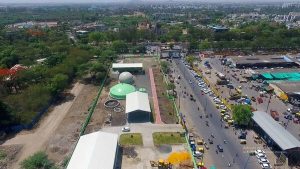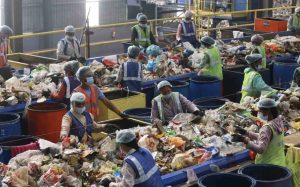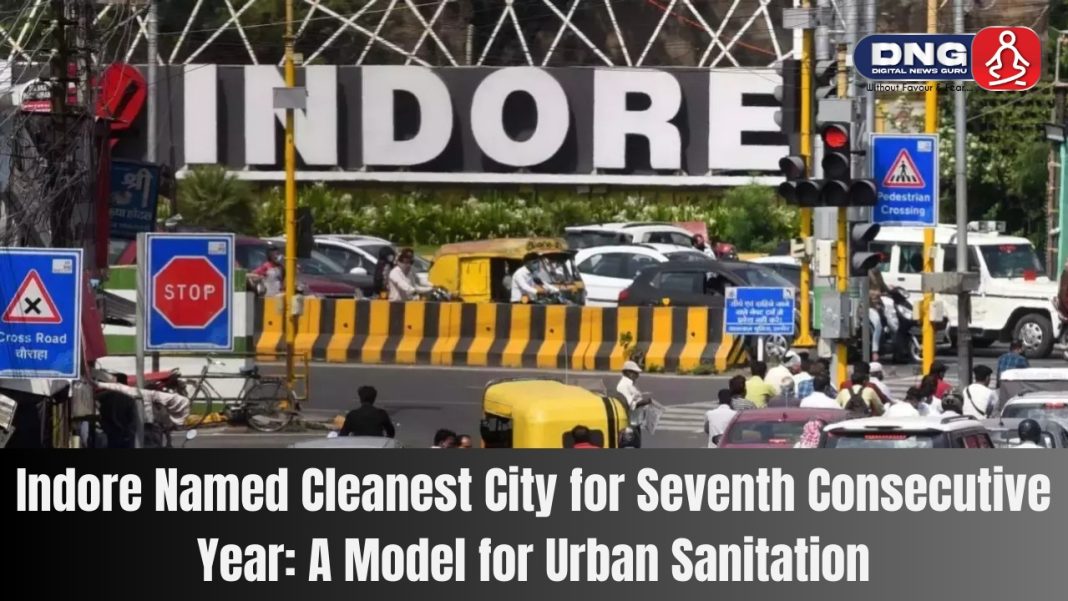DIGITAL NEWS GURU INDORE DESK:
Indore Named Cleanest City for Seventh Consecutive Year: A Model for Urban Sanitation
In a remarkable achievement, Indore has once again been crowned the cleanest city in India, marking its seventh consecutive year at the top of the Swachh Survekshan rankings.
This recognition is part of India’s annual cleanliness survey conducted by the Ministry of Housing and Urban Affairs under the Swachh Bharat Mission, a flagship initiative aimed at promoting cleanliness, sanitation, and hygiene across the country. Indore’s sustained performance in cleanliness has not only brought pride to the city but also serves as an inspiration for urban centers across India to raise their sanitation standards.
Indore’s Cleanliness Journey
Indore’s ascent to the pinnacle of urban cleanliness has been no small feat. It began in 2016 when the city launched an aggressive campaign to address its waste management and sanitation issues. The local administration, in collaboration with citizens, civil society, and various stakeholders, implemented a comprehensive waste management strategy that involved waste segregation, efficient garbage collection, and waste processing systems. Over the years, these efforts have only intensified, enabling the city to clinch the title of India’s cleanest city year after year.
One of the critical factors behind Indore’s success is its emphasis on public participation. The administration has worked tirelessly to engage citizens in the cleanliness drive, organizing awareness campaigns, conducting workshops, and involving local communities in initiatives like waste segregation at the source. As of today, nearly 100% of Indore’s households practice waste segregation, and the city boasts an impressive waste collection system that operates around the clock.
Government Response and the “Golden City” Club

In response to Indore’s achievement, the Indian government has announced plans to form a “Golden City” club. This initiative aims to recognize cities that consistently perform well in cleanliness surveys and encourage others to follow their lead. The club will serve as a platform for these cities to share best practices, collaborate on sanitation projects, and drive further improvements in urban hygiene across India.
The formation of this club is not just about celebrating the winners but also about spreading the successful models to cities that lag behind. Indore’s performance is a testament to the transformative power of a well-coordinated, citizen-focused cleanliness initiative, and the central government hopes to replicate this success in other urban areas through knowledge sharing and collaboration.
Waste Management: The Key to Success

At the heart of Indore’s cleanliness success is its robust waste management system. The city has adopted a zero-waste approach, with a network of composting plants, recycling facilities, and waste-to-energy plants that ensure minimal waste ends up in landfills. Indore’s model involves segregating waste into wet and dry categories at the source. Wet waste is converted into compost, which is used to enrich soil and promote organic farming in and around the city, while dry waste is recycled or repurposed for energy generation.
The city has also invested heavily in infrastructure to support its cleanliness mission. It has a fleet of over 600 waste collection vehicles equipped with GPS tracking systems to ensure timely and efficient waste collection. Additionally, the city has set up a decentralized waste processing system with multiple processing units spread across the city, reducing the burden on landfills.
Beyond waste management, Indore has made strides in promoting hygiene and public health. It has constructed thousands of public toilets, improved water supply and sewage systems, and implemented strict regulations to prevent littering and pollution. The administration has also employed technology to monitor cleanliness in real time, using drones and sensors to track waste accumulation and clean-up efforts.
Citizen Participation: A Driving Force

Indore’s success story would not have been possible without the active involvement of its citizens. The city’s administration has created a strong culture of cleanliness by engaging residents in various activities such as cleanliness drives, awareness campaigns, and workshops on waste segregation and management. Schools and colleges have been involved in the effort, educating students on the importance of sanitation and encouraging them to take ownership of their surroundings.
In addition, the administration has introduced innovative methods to encourage participation, such as rewarding neighborhoods and housing societies that perform well in maintaining cleanliness. This collaborative approach has fostered a sense of civic responsibility among the citizens, making cleanliness a community-driven effort.
Setting an Example for Other Cities

Indore’s achievement serves as a powerful example for other cities in India that are struggling with waste management and sanitation issues. The city’s success demonstrates that with proper planning, community involvement, and political will, it is possible to transform urban environments into clean and healthy spaces.
The Swachh Survekshan rankings have played a crucial role in motivating cities across the country to improve their sanitation standards. With Indore consistently setting the benchmark, other cities are now working harder than ever to follow suit. The central government’s decision to form the “Golden City” club is expected to further incentivize cities to adopt best practices in waste management and sanitation.
Challenges Ahead

Despite its achievements, Indore faces ongoing challenges in maintaining its status as the cleanest city. As the city continues to grow and urbanize, managing the increasing amount of waste will require continued innovation and investment in infrastructure. Moreover, sustaining public engagement over the long term is critical to ensuring that the cleanliness drive does not lose momentum.
The government’s new initiative, the “Golden City” club, could play a pivotal role in addressing these challenges by providing a platform for cities like Indore to collaborate with others, share successful strategies, and work towards common goals.
YOU MAY ALSO READ: Typhoon Yagi’s Impact: A Devastating Blow to Vietnam








